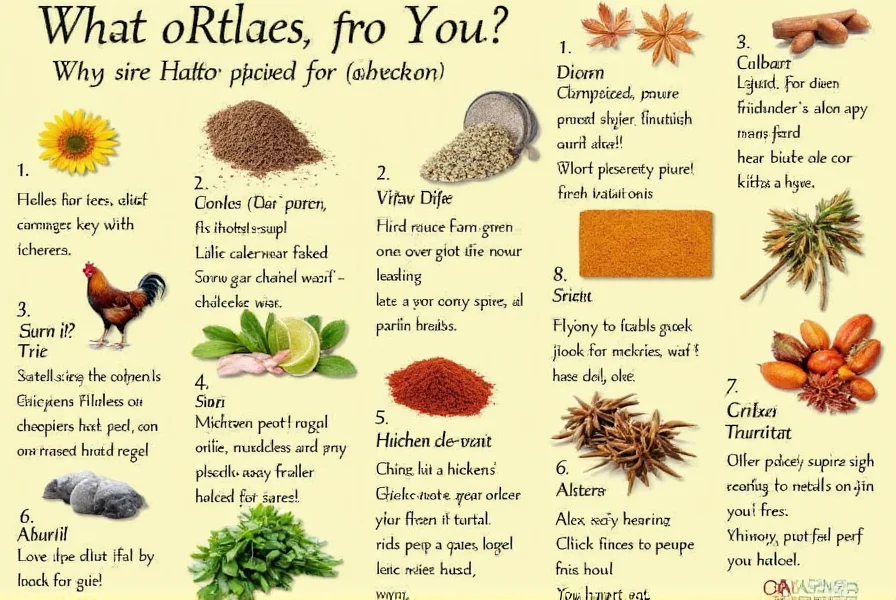Table of Contents
Safe Spices for Chickens
Based on veterinary guidelines and poultry research from trusted sources like the University of Maryland Extension and the American Poultry Association, these six spices are safe and beneficial for chickens when used in moderation:
| Spice | Key Benefits | Safe Usage |
|---|---|---|
| Cumin | Boosts digestion, stimulates appetite, supports immune function | 1/8 tsp per chicken daily mixed in feed |
| Oregano | Antioxidant-rich, natural respiratory support, antimicrobial properties | 1/4 tsp dried in feed or water daily |
| Paprika | Enhances egg yolk color (vitamin A), improves circulation | 1/8 tsp per chicken daily (avoid excessive amounts) |
| Garlic | Immune system support, improves egg quality, natural parasite deterrent | 1 crushed clove per 4 chickens in water 2-3x/week |
| Fennel | Reduces gas/bloating, aids digestion, improves feed conversion | 1/8 tsp seeds per chicken daily |
| Cinnamon | Anti-inflammatory, blood sugar regulation, respiratory support | 1/8 tsp per chicken daily mixed in feed |
Spices to Avoid
Some common spices are toxic or harmful to chickens. Always avoid:
- Nutmeg - Contains myristicin which can cause toxicity, seizures, or death in large amounts
- Onion powder/garlic powder - Causes hemolytic anemia (destroys red blood cells)
- Excessive cayenne pepper - Can irritate digestive tract (though small amounts of mild chili are generally safe)
- Any spice blends with salt, MSG, or artificial additives - Chickens cannot process these safely
According to the University of Maryland Extension, "Chickens lack the ability to metabolize certain compounds found in human spices, making some seemingly harmless ingredients dangerous."
Practical Usage Tips
- Start small - Introduce one spice at a time with a pinch (1/16 tsp) for 3 days before increasing
- Never use fresh spices - Only use dried, pure spices without fillers or additives
- Never add to water - Spices can settle at the bottom and cause uneven consumption
- Monitor droppings - Changes in color or consistency indicate improper dosage
- Never replace medicated feed - Spices are supplements, not medical treatments
For best results, mix spices directly into dry feed and store in airtight containers away from light. Always consult a poultry veterinarian before introducing new supplements to sick birds.
Frequently Asked Questions
Are there any spices that improve egg production?
Spices don't directly increase egg production numbers, but oregano and garlic can improve egg quality by enhancing yolk color and nutritional density. Healthy chickens with balanced diets typically lay more consistently.
Can I use fresh spices instead of dried?
No. Fresh spices contain moisture that can spoil feed and promote mold growth. Always use dried, pure spices without additives. Fresh garlic should be avoided entirely due to its high moisture content.
How do I know if I'm giving too much spice?
Signs of overdose include lethargy, reduced appetite, diarrhea, or changes in eggshell quality. If observed, immediately stop the spice and provide fresh water. Always follow dosage guidelines based on chicken weight and health status.
Conclusion
When used correctly, spices can be a valuable supplement for chicken health. Stick to the six safe spices listed above, avoid toxic varieties, and always follow proper dosage guidelines. For the most reliable results, consult a poultry veterinarian before introducing new supplements to your flock.











 浙公网安备
33010002000092号
浙公网安备
33010002000092号 浙B2-20120091-4
浙B2-20120091-4